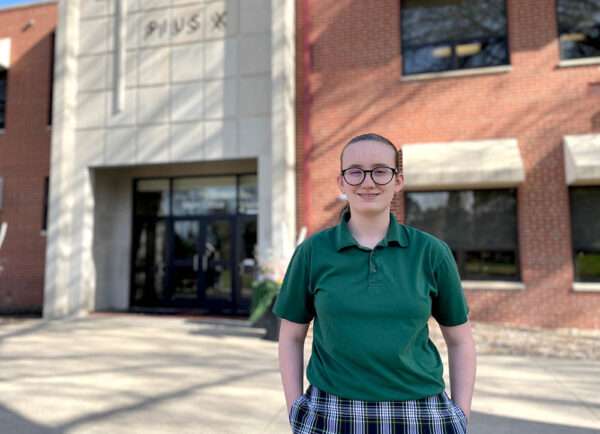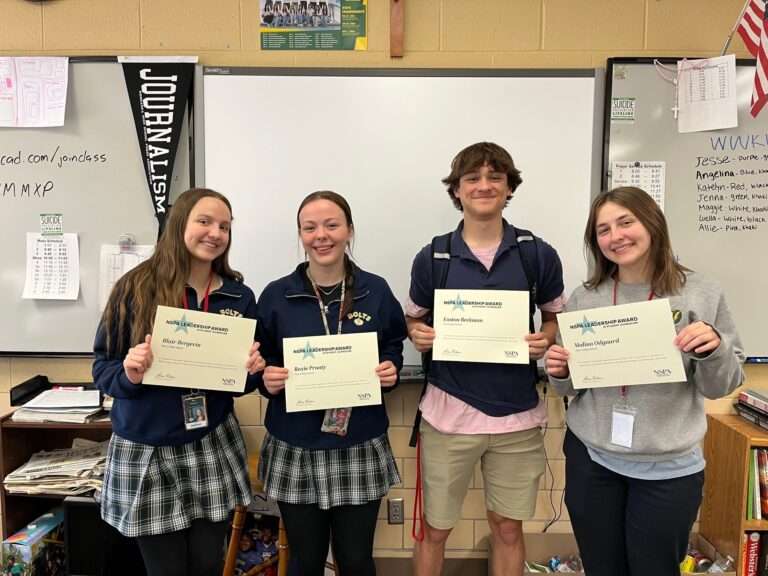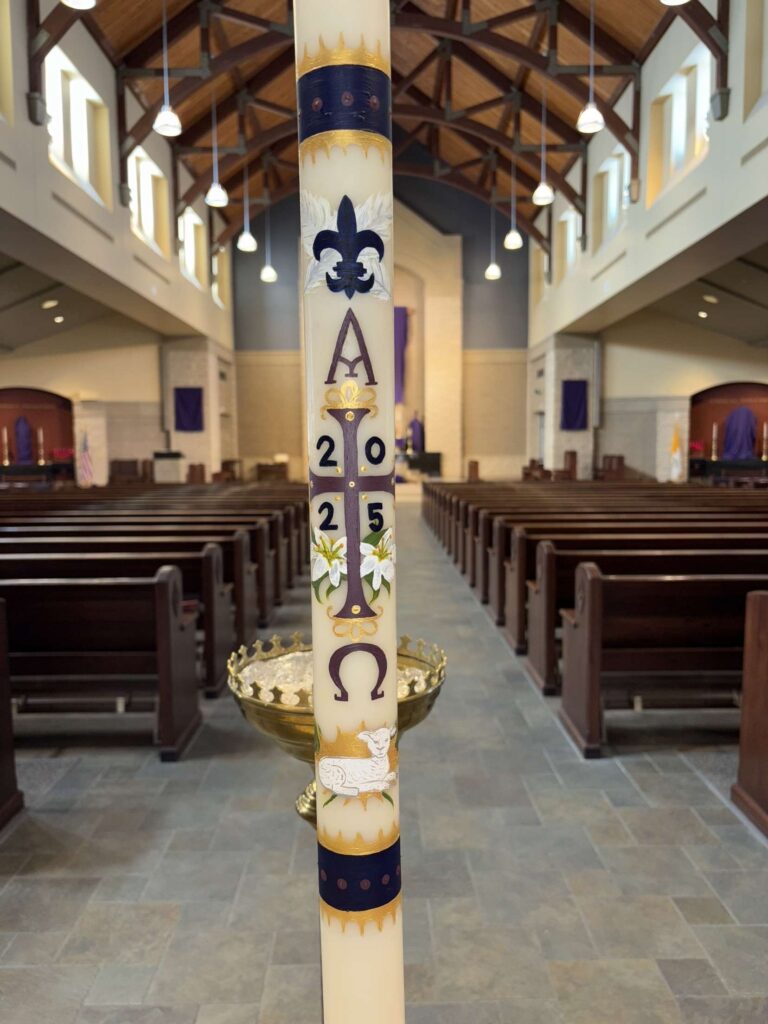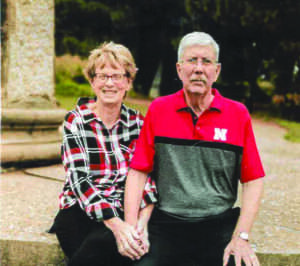Junior Grace Langdon won a statewide writing competition for her story ‘The Garden of Hope’ in the third annual Nebraska Emerging Writers and Artists Contest. Her Q&A and short story is shared below, and the details of the competition are at the bottom of this page.
Have you written stories or other types of writings before?

Grace Langdon: I’ve always loved writing stories for fun and have written some short stories as a hobby, but I’ve never gone farther with them than my inner circle, so this was my first serious writing project, which made me very nervous to submit my work. When I was younger, I wrote stories as gifts for my grandmother, who gently critiqued and eagerly encouraged me to pursue the craft of writing.
What inspired this story, ‘The Garden of Hope’?
Grace: When my Creative Writing teacher Mr. Johnson told my class about the contest and its prompt “Untold Stories of Nebraska”, I knew I wanted to participate, but I couldn’t think of any good ideas. I scrolled through countless web pages and blogs about Nebraska’s history, until finally I found a picture of the Sunken Gardens with a quote from Ernest M. Bair, the creator of the garden. I remembered when I was a kid my father would take me and my siblings to the garden every summer, and later I found out it had been a significant place in my mother’s childhood as well. I realized I had never really thought about the garden’s history or looked any deeper into it, and when I did, I found it deeply inspiring and absolutely had to write about it.
How does it feel to be honored for your work?
Grace: It really makes me happy! I am so grateful for the opportunity to improve my writing and even share it with others. It has given me the confidence and optimism to believe in my abilities and continue into a career involving writing. I also thought that Bair’s message he wanted to give the world through his garden was an important one, and I feel honored to be a part of keeping this message alive.
The Garden of Hope
by Grace Langdon
A man named Bair stood on the sidewalk beside the street. He was grinning ear to ear, which earned him some strange looks, to say the least. No one smiled during the Depression, and if they did, they did their best to hide it in solidarity with the rest of the world. What was it, then, that made this man stop in his tracks and feel unfettered joy amid the dark and gloomy town of Lincoln, Nebraska? A pile of garbage in a muddy dumping ground. Or rather, what it could become. When Bair saw this lot, all he could see was hope for the future, something the world had been starved of for far too long. And if the world was hungry for hope, by God, he’d feed it until it was well sated.
Meanwhile, a young man named Henry Goebel trudged down the gloomy street. He kept his head down low under the drizzling rain, long blonde hair casting shadows over his face. “Please, sir, stop!” He struggled to avoid the eyes of the mother calling to him from her parked car. “My children don’t deserve to live like this! We’re homeless, please!” She called as he walked by, her desperate pleas accentuated with the sobbing of a hungry child. Henry gritted his teeth, his eyes still fixed on the ground. Like I’ve got anything to give? The daily reminder of the state of the world was not enough to numb him to the pain the world was feeling, and he felt it with every fiber in his body.
A sudden collision took Henry from his thoughts and sent him flying to the ground, his briefcase opening and papers scattering everywhere, becoming damaged by the falling rain. Great, just what I needed. He bitterly swore under his breath as he stood up, shaking the dust from his clothes. “Sorry ‘bout that, young man!” A cheerful voice caused Henry to come out of himself and realize guiltily that he had bumped into an older man, causing him to fall to the ground as well.
Henry leaned over to help him to his feet apologetically. “No, sir, I should have watched where I was going…” Henry trailed off as his curiosity took hold of him. The older gentleman couldn’t have taken the fall very well, yet the man was beaming.
He chuckled good-naturedly. “No, no, what kind of moron stands in the middle of a walkway during rush hour, right? Here, let me help you-” The man stopped speaking so suddenly Henry thought he had gone mute. Bending over, he reverently picked up one of the papers that Henry had dropped. Finally, he spoke again in a hushed, solemn voice. “Son, these are blueprints…” He looked up at Henry, eyes wider than the moon. “Are you an architect?”
Henry shrugged awkwardly. “Um… Well, no, but my father is, and sometimes I help him with work. You might have heard of his company, it’s called Goebel’s.”
A smile took the odd man’s face again, and reaching out to shake Henry’s hand, he spoke with vigor. “Son, the name’s Ernest Bair, City Commissioner. I’d like to speak to you and your dad right away.” Henry’s mouth gaped open in shock. City Commissioner?! Nodding, he led the way. Now that he realized what an important figure he had been talking with, he treated him with the utmost respect that he could. But it was more than that which drove Henry to bring the stranger to his home. Something about the man’s passion he conducted himself with made Henry almost feel… hope?
Now Henry sat in the dimly lit dining room beside his father and across the table from Mr. Bair. The rain was still pounding upon the rooftops like a herd of horses galloping, giving the room a heavy and serious atmosphere. After the formalities of introduction, Mr. Bair with his ever-present smile glaring, spoke candidly of his vision. “There’s a dumping ground on the corner of 27th and D, full of garbage. The place does no one any good, other than the kids that go sledding there every winter. I expect to make this spot the most beautiful place in the city. The ground lends itself perfectly to the making of a sunken garden.”
Henry’s eyes shined as the man spoke. He eagerly looked to his father for approval. Mr. Goebel, at last, spoke. “A garden? You think a garden is going to change things? Mr. Bair, with all due respect, if you want to make a difference, I believe you must do so directly. Want me to design a soup kitchen, a homeless shelter? I’d be more than happy to serve my town in that way. But a garden? It’s a waste of money, waste of time.” The man leaned back, taking a sip of his coffee.
Bair was unphased, his gaze pinned squarely on Mr. Goebel. “We’ve already got those things, Freddy. This Depression has sucked the spirit, the joy, out of the people of Lincoln. What good can be done when everyone’s so damn depressed? I agree with you, the needs of the body have got to be met. But people are so quick to forget the needs of the soul.” Seeing Mr. Goebel was still hesitant, Mr. Bair spoke words that Henry wouldn’t forget for the rest of his life. “So, what do you say, Freddy? Why don’t we go give the people of Nebraska a reason to smile?” Henry felt chills down the back of his neck, suddenly filled with purpose.
Mr. Goebel, who was much less sentimental than the other two men in the room, glanced at his son before glaring at Bair, facing an internal struggle. At last, he made up his mind. “If we’re going to be working with each other, Mr. Bair, you must get one thing straight. It’s Mr. Goebel. Or Fred. Not Freddy.”
Mr. Bair laughed heartily, shaking Mr. Goebel’s hand. “Sure, Freddy, sure! Now let’s get to work, there’s no time to waste!”
Over the next several months, all three men worked tirelessly to build the garden. Mr. Goebel, being the more experienced architect, took charge of the blueprints. Henry helped where he was allowed, feeling a sense of pride when his father accepted his unconventional idea of reflection pools, praising him for the idea that was entirely unheard of at the time. Mr. Bair, meanwhile, was busy finding workers, which wasn’t so difficult in the midst of the Depression. The kindhearted man hired nearly everyone who approached him, prioritizing family men who had become unemployed due to the state of the economy. He’d end up providing a steady income to over 200 men in total who labored to work on the garden, changing the lives of every single one and his family. Finally, the garden was ready to be built.
At first, progress was steady, with Mr. Bair watching over the workers firsthand. Henry followed along, wanting every chance he could get to work with Mr. Bair, who had become something of a mentor to him. Mr. Goebel would stop by routinely to see how progress was coming, as well as to work with Bair, though he’d never admit it. He had begun to respect the man and became rather good friends with him. Every now and then they’d sneak off to the Speakeasy after a long day of work, drinking merrily together. Things were beginning to look hopeful again.
That was when the Dust Storm hit. It destroyed nearly all the progress they had made with the garden and brought a terrible drought to the region to boot. The conditions became worse, every day the men labored in the harsh conditions. Many quit the project entirely, losing all enthusiasm they had once had. But Bair stayed optimistic through the entire ordeal. Even on the days he was the only man to come to work, he stayed well past dark, Henry close behind. But the workers always returned, and Bair welcomed them warmly. Little by little, their progress was recovered.
The garden was completed in the Spring of 1931 and named the Sunken Gardens. The final day of work, tears were shed, songs were sung, and hope was found for every man that had worked hard to bring life to the once rejected soil. The crew partied for hours in the finished garden. One worker brought his daughter who was no higher Bair’s knee. The men recognized her, as she had watched the production of the garden every day from her window, smiling and waving to the working men. She approached Mr. Bair, a shy expression on her little face. “Mr. Bair, thank you for building the garden. It’s the most beautiful thing in the world.”
Bair responded with a kind smile, kneeling to look her in the eye. Picking a nearby daisy, he held it up to her. “Why, thank you, little lady. We built it just for you.” A smile spread across her rosy cheeks. He placed the flower in her hair, and she skipped back to her father, suddenly shy of the kind man.
One by one, the men said their goodbyes and returned home, until only Mr. Bair, Mr. Goebel, and Henry remained, sitting together on the stone wall, silently gazing upon the garden. It had developed a life of its own through the many creatures that now inhabited it. They reverently watched as the koi fish swam carelessly through the reflection ponds. A gentle gust of wind brushed through the vibrant flower beds, carrying the peaceful song of crickets through the sweetened air. The sun barely clung to the horizon, casting long shadows over the garden. The glow of dusk reflected off the bronze statues, setting them ablaze. It was the most beautiful sight Henry had ever seen in his life, and it was one he had given life to. He closed his eyes, cherishing the moment alongside his father and mentor.
Mr. Bair spoke to break the silence, and would you believe that he did it with a grin? “Freddy, Henry, I’ve always believed that it’s impossible to change the world. Whatever you do, there’ll still be so much evil out there it’s almost like you did nothing at all. But it is possible, and this I know for a fact, to change your own world. You can change the world for a select few. And I believe that’s what we’ve done today. We’ve changed the world for the people of Nebraska, and that’s something to be damn well proud of!” Henry beamed with pride. They had changed their own corner of the world, and that was enough for a lifetime.
“Mr. Goebel?”
A voice took Henry out of his memories. Begrudgingly, he pried his eyes open to the reality that now stood before him. It had been years since the garden was completed, and both his father and Mr. Bair had passed away long ago. The arthritic pains caused by his place on the stone wall reminded him that he too was getting on in years. It was the very same place he had sat so long ago, when he had watched the serene garden. He looked around the garden as it was now, without the glow of nostalgia. Much of the vegetation was dying and the stone floors were caked in mud. The statues had been damaged and repaired so many times that the scars left behind were visible, and the ponds he had taken such pride in were filled unevenly, abandoned and uncared for. The garden had been damaged by flooding in recent years, and visitors grew scarcer by the day. It was hardly recognizable, and it made Henry sick to look at.
He breathed in deeply, turning to the man that sat beside him on the bench. “I’m sorry, could you say that again?”
The younger man smiled patiently, repeating his question. “I asked what you thought about renovating the garden. I realize it must hold so many memories for you, and it can’t be easy to see it change, but-”
Henry interrupted him with a hearty laugh, relieved of his fear that the city wanted to demolish his precious garden. When met with the confused expression of the younger man, he answered him happily. “Well, what’s the alternative, a hole in the ground?”
“I’m not sure what you mean, sir?”
Henry looked around the garden again. “We didn’t build it just to let it die, son. Whatever it takes to keep the garden alive has got to be done. Our intention was not to create our own legacies, we just wanted to see the world smile again.” Smiling to himself, he paused. “Our world, at least.” Turning back to the young man, he continued. “I think my old man and Mr. Bair would agree. If renovating can keep people smiling all these years later, that’s the best thing that could happen.”
A year later, Henry Goebel passed away before the renovations could be completed. But, having given his blessing, the city pushed on in his memory. The garden, now known as the Sunken Gardens of Lincoln, Nebraska, stands proudly on the corner of 27th and D streets. Today, it is beloved and well cared for by volunteers in the community yearly, who come together to remember the story of hope that Ernest Bair had created for the people of Nebraska long ago. They come to reconnect with each other, to keep the town beautiful, and more than anything else, to smile.
About the competition
Open to any Nebraska high schooler, the contest called for submissions of essays, poems, short stories and artwork using this year’s theme, “Nebraska’s Untold Stories,” as inspiration. The winning students are invited to share their work April 28 during the language and literature conference hosted by the UNK Department of English.
The competition was created by the Phi Eta Sigma freshman honor society at the University of Nebraska at Kearney to promote literacy and creative activity among young people. It’s co-sponsored by the UNK Writing Center, American Democracy Project, Sigma Tau Delta English honor society, Phi Alpha Theta history honor society and UNK Art Society.





